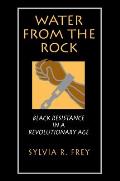British Policy and the Backlash
In 1991, Sylvia Frey published Water from the Rock: Black Resistance in a Revolutionary Age, mostly about the last years of the Revolutionary War.
During those years the British army operated under a policy that Gen. Sir Henry Clinton declared in the Phillipsburg Proclamation of June 1779:
Clinton acted out of pragmatism, not ideology. He and his subordinate generals hoped that measure would encourage slave owners to remain loyal (the proclamation didn’t address Loyalists’ slaves). They wanted to harm rebel planters’ wealth and disrupt their society.
But the result, Frey argued, was that white colonists became more frightened and resentful. Men who had been mild Patriots became militant, and men who had been neutral joined the Patriots—enough to tip a largely even battle in the southern countryside in favor of the Americans. Ultimately the result was Gen. Cornwallis’s surrender at Yorktown. Clinton’s proclamation thus came back to bite him in the arse.
In 1999 Woody Holton’s Forced Founders: Indians, Debtors, Slaves, and the Making of the American Revolution in Virginia highlighted a similar dynamic earlier in the war. As Frey documented in an early chapter, whites in Britain’s slaveholding colonies constantly feared an uprising by the people they held in bondage. Throughout 1775 there were rumors that Virginia’s royal governor, Lord Dunmore, was encouraging enslaved people to rebel against the rebels. And toward the end of the year, Dunmore made those rumors true!
While promoting a new book covering the entire Revolution, Liberty Is Sweet: The Hidden History of the American Revolution, Holton has been using Twitter to share many bits of evidence about those fears in 1775 and how they affected people’s thinking. He argues that white southern leaders’ fear about royal policy on slaves alienated them from the Crown and turned a significant number of them in favor of independence by early 1776.
Or in the words of Nikole Hannah-Jones’s “1619 Project” essay: “…one of the primary reasons some of the colonists decided to declare their independence from Britain was because they wanted to protect the institution of slavery.”
Now I think that the context of that sentence in Hannah-Jones’s essay indicates she relied more on the idea that anti-slavery sentiment in Britain was a major factor and less on military developments in America. I don’t see evidence that American colonists really worried about Granville Sharp’s few followers. But many colonists, especially in the areas with large enslaved populations, did worry that royal officials would make reckless decisions that threatened their wealth and their lives. That was part of the stew that led to the July 1776 vote for independence. And later to the military victory that cemented independence.
During those years the British army operated under a policy that Gen. Sir Henry Clinton declared in the Phillipsburg Proclamation of June 1779:
I do most strictly forbid any Person to sell or claim Right over any NEGROE, the property of a Rebel, who may take Refuge with any part of this Army: And I do promise to every NEGROE who shall desert the Rebel Standard, full security to follow within these Lines, any Occupation which he shall think proper.In other words, any enslaved American who made it to the British lines and claimed to have escaped from a rebel could become free, and could even help the British military forces against the Americans.
Clinton acted out of pragmatism, not ideology. He and his subordinate generals hoped that measure would encourage slave owners to remain loyal (the proclamation didn’t address Loyalists’ slaves). They wanted to harm rebel planters’ wealth and disrupt their society.
But the result, Frey argued, was that white colonists became more frightened and resentful. Men who had been mild Patriots became militant, and men who had been neutral joined the Patriots—enough to tip a largely even battle in the southern countryside in favor of the Americans. Ultimately the result was Gen. Cornwallis’s surrender at Yorktown. Clinton’s proclamation thus came back to bite him in the arse.
In 1999 Woody Holton’s Forced Founders: Indians, Debtors, Slaves, and the Making of the American Revolution in Virginia highlighted a similar dynamic earlier in the war. As Frey documented in an early chapter, whites in Britain’s slaveholding colonies constantly feared an uprising by the people they held in bondage. Throughout 1775 there were rumors that Virginia’s royal governor, Lord Dunmore, was encouraging enslaved people to rebel against the rebels. And toward the end of the year, Dunmore made those rumors true!
While promoting a new book covering the entire Revolution, Liberty Is Sweet: The Hidden History of the American Revolution, Holton has been using Twitter to share many bits of evidence about those fears in 1775 and how they affected people’s thinking. He argues that white southern leaders’ fear about royal policy on slaves alienated them from the Crown and turned a significant number of them in favor of independence by early 1776.
Or in the words of Nikole Hannah-Jones’s “1619 Project” essay: “…one of the primary reasons some of the colonists decided to declare their independence from Britain was because they wanted to protect the institution of slavery.”
Now I think that the context of that sentence in Hannah-Jones’s essay indicates she relied more on the idea that anti-slavery sentiment in Britain was a major factor and less on military developments in America. I don’t see evidence that American colonists really worried about Granville Sharp’s few followers. But many colonists, especially in the areas with large enslaved populations, did worry that royal officials would make reckless decisions that threatened their wealth and their lives. That was part of the stew that led to the July 1776 vote for independence. And later to the military victory that cemented independence.


No comments:
Post a Comment